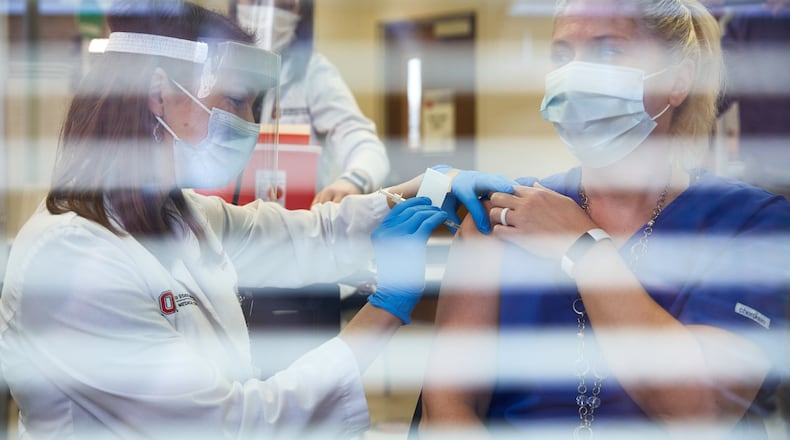A home run in the form of the end of the pandemic is of course easier to hope for than it is to accomplish, despite the fact that the safety of the vaccines have been verified by leading health experts and endorsed by a bevy of officials on both sides of the political divide.
There is a trust issue that we must overcome so we can all move forward and have a brighter 2021 than 2020.
Nearly 64% of the 200 local residents who participated in our unscientific online survey said they plan to get a coronavirus vaccine. Roughly 12% said they might get the vaccine, and 24% said they won’t.
Nationally, multiple scientific studies, those by Kaiser Family Foundation, Gallup and the Pew Research Center included, have shown that about 60% to 70% of Americans have said they’d get the vaccine.
That may not be enough for herd immunity, experts say.
Large chunks of society are still very, very reluctant.
Surveys show that vaccine hesitancy was higher among Republicans than Democrats.
That Pew Research Center survey of 12,648 U.S. adults conducted Nov. 18 to 29 found a 19-point gap between Democrats and those who lean to the Democratic Party (69%) and Republicans and Republican leaners (50%) who say they would get vaccinated for the coronavirus.
Hesitation is also high in the Black community and among those who live in rural areas.
Thirty five percent of people in both of those groups say they definitely or probably would not get vaccinated, the Kaiser survey found.
This is particularly troubling because Blacks have borne a disproportionate brunt of the virus’ burden.
A New York Times analysis of data from nearly 1,000 U.S. counties found that Black and Hispanic people are nearly three times as likely to contract COVID-19 and nearly twice as likely to die from coronavirus than white Americans.
We are at a point in the pandemic that many around the world have been hoping for: the coronavirus vaccines are being rolled out.
We understand why some are reluctant to get a vaccine:
● Although health experts here and abroad say no corners were cut, the vaccines are new. Followed by fears of side effects, lack of trust in the government and newness of the vaccine were the number one and two reasons cited by those who told Kaiser they would not take the shot.
● Like the virus itself, the vaccines have been politicized.
● Black people and members of other groups have a history of mistrust of the medical establishment based on history.
We are not discounting those fears, but we urge you to educate yourself and lean to reliable sources.
Health departments have launched outreach efforts to raise awareness and build confidence in the vaccine.
Share your concerns with them. Ask the questions you need addressed in order to confidently take a vaccine when it is available to you.
Public Health-Dayton & Montgomery County has created an online survey to gauge the community’s attitudes about receiving a coronavirus vaccine.
Take this seriously.
It is not a hoax.
The conspiracy theories are just that, conspiracy theories.
More than 320,000 Americans have died. That number has included more than 8,000 Ohioans.
You’ve read some of their stories in this very paper.
Millions in our nation have been sickened. Millions have lost their livelihoods.
A return of normalcy will be on the horizon if we all do our part and work for it.
To use another sports metaphor, we cannot afford to drop the ball on the five yard line.
That’s not a touchdown in anyone’s book.
Editorials are our Editorial Board’s fact-based assessment of issues of importance to the communities we serve. These are not the opinions of our reporting staff who strive for neutrality in their reporting.
About the Author

